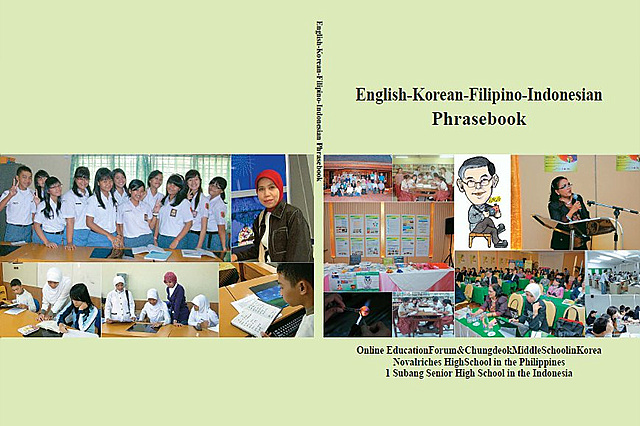|
English-Korean-Filipino-Indonesian Phrasebook Project Review
Preface : The world at present is continuously changing and evolving, advancing towards a future that demands all global citizens to keep up with the pace dictated by progress in science and technology. Everyone is encouraged to grow as persons capable of facing challenges of the 21st century and often, these challenges demand that people possess a basic knowledge and a certain level of competence and skill in a number of languages to better promote understanding in the field of communication. It is with this in mind that this Korean-English-Tagalog-Indonesian collection of phrases was written and published. This book is dedicated to all Filipinos , Koreans and Indonesians who wish to broaden their horizons by learning each other¡¯s history and culture with English bridging the gap as a common medium for languages. It aims to equip the average learner with enough information on basic words and phrases to enable him to understand and equip him in conversing with the Korean or the Indonesian Community who shares his interest . MARIA NOEMI M. MONCADA, Ed.D., LlB.(Principal IV) Indonesian Editor¡¯s Note: People to people exchange is something that can not be avoided in this globalization era. Eventhough it is not a new trend because it was also happened in the past simultaneously with the exchange of goods. Nowadays the exchange is becoming very important since the world now is united by one common interest to make the world become more prosperous and peaceful. The trend is now translated by many MoUs or MoAs of Free Trade, Free Tariff, etc. that are signed by world leaders to enable not only goods but also people to be exchaged much more easier and cheaper. Those agreements have made people become citizens of the world. Peole can live wherever they like, do whatever they are able to. That is the reason why people are now becoming so mobile, moving one place to another ones to do so many works as they can support living wherever they like. On one hand, it is considered unfair because not all people have similar competencies to meet the requirements needed such as knowledge, technical and language skills to fill the job vacancies. But on the other hand, this trend will drive people to master knowledge and skills required to survive in this global competition. As I have mentioned above, that language skill is one of the requirements needed in this tight competition. Therefore, students are suggested to become multilingual that will help them win the competition. The ability to master more than one languages will not only help students win the competition but also make them learn the culture and custom of the people spoken the languages. This is very important because by learning culture and custom, students will appreciate them. It is hopeful that by giving good appreciation the students will understand and eliminate prejudices that might happen because of the nation arrogancy. Eventually, this will contribute to the world peace. This phrasebook, I believe, will be one step for the to students of the three nations to build this harmony. Rika Rachamita
Sujatma Introduction: ( This is only the first step to be friends.): This book is published as one of a cooperative
projects of APEC ALCoB school. We published The Korean-English-Tagalog
Dictionary 3rd edition on Feb, 2009. The teachers and students in orea
and in the Philippines participated in this project together. In Korean Education Authority, IACE,
DEPED(the Philippines Education Ministry) and Quezon City
library, the editions were distributed and were given a good review. HASEON
HWANG
Proposer: Mr. Ha-seon Hwang Contributors: Special Thanks: Contents : Preface/¼¹®/Paunang salita /Kata pengantar Volume: about 100pages (B5 size book) / pdf version Publishing: published in Korea -paper back and pdf version (limited publication) Detail : http://ictmsn.org/projects/projects09/onlineproject09.htm |



